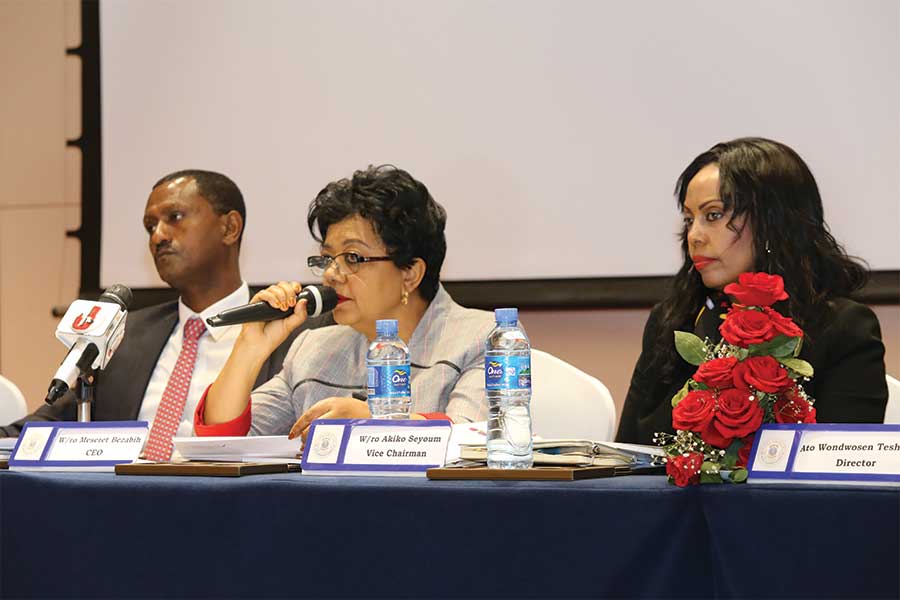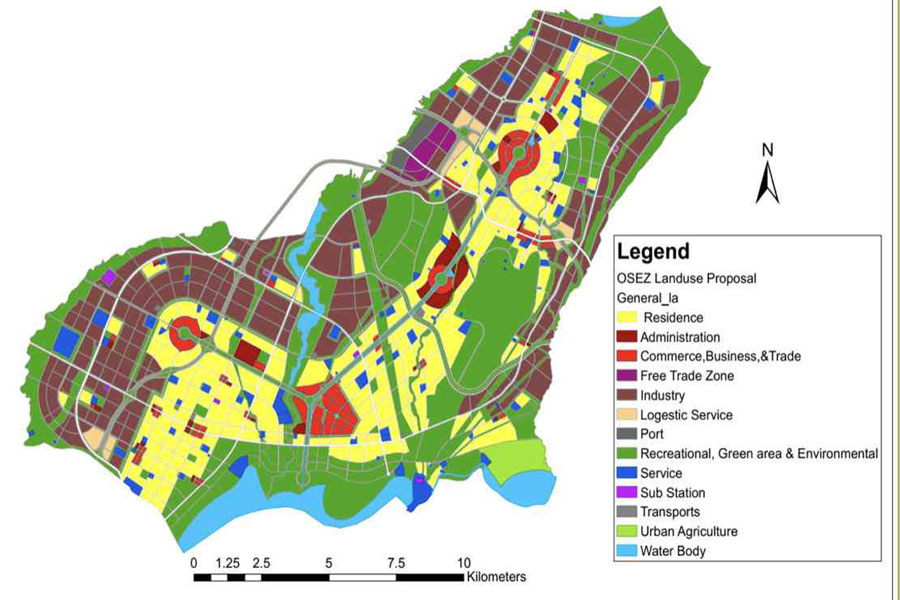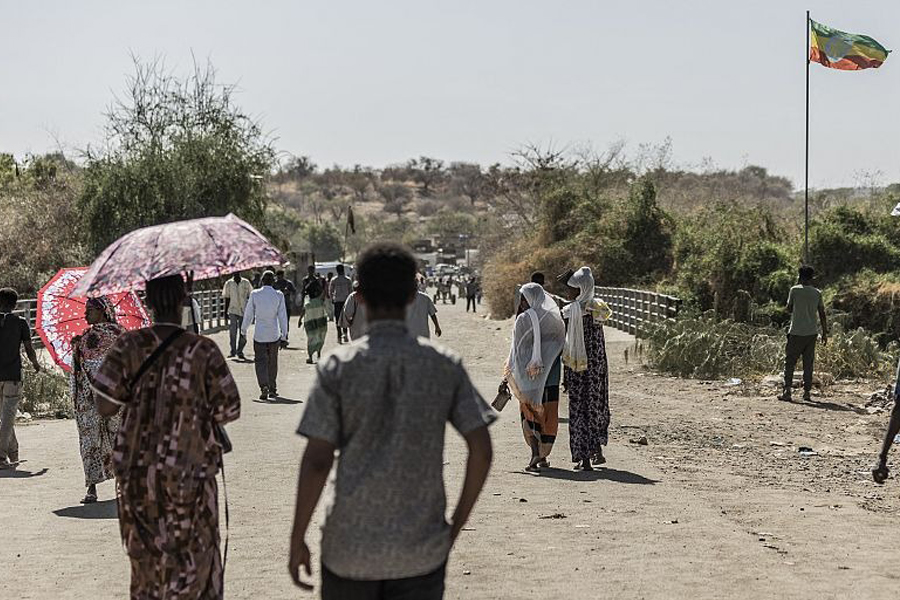
Fortune News | Nov 30,2019
The Addis Abeba city authorities have ambitious plans for a sprawling new Special Economic Zone (SEZ) planned in the Gotera area of the Nifas Silk Laphto District. The project, dubbed “Addis Tomorrow,” is an initiative of Prime Minister Abiy Ahmed (PhD), slated to include zones dedicated to international trade, education and culture, business and finance, and modern housing.
According to Bereket Takele, press secretary at the Mayor’s Office, the initiative aims to transform Addis Abeba into an economic powerhouse in addition to its existing political and diplomatic significance. The details of the financial deal between the city administration and the contractor remained undisclosed, leaving city finance bureau officials in the dark about the investment scheme.
Mayor Adanech Abiebie revealed that a three-year preparation, feasibility study, and a hunt for a prospective developer preceded the agreement signed with China First Highway Engineering Group (CFHEC), a subsidiary of China Communications Construction Company (CCCC). The contractor has previously undertaken projects in other African countries, including the Democratic Republic of Congo (DRC).
The company was fined 18.6 million dollars and debarred for three years by the African Development Bank Group (AfDB) for “fraudulent and collusive practices” in a past project in Congo.
“The developer will handle all technology and construction costs,” said Bereket, emphasising that the city only provided the land. “They`ve paid the lease under the current price.”
A land lease auction recently saw values in the District fetching between 63,000 and 103,000 Br for a square meter.
The 35,000sqm area from Gotera junction to Saris has a history of failed mega projects. It was formerly a manufacturing site for Addis Abeba Cement (later acquired by Mugar), now mined by local youth for leftover metals and equipment.
In 2015, former President Mulatu Teshome (PhD) laid the foundation stone for a 21-floor and 20-block real estate complex jointly launched by a Chinese developer, Sino Mark, and Saba Engineering Plc. Touted as the largest and most luxurious real estate development with a budget of four billion Birr, the ‘Royal Garden’ project never materialised. Four years later, plans for a modern housing project in partnership with CCCC were announced by Deputy Mayor Takele Uma, on a 27hct plot. It did not take off.
The area has since become a hotspot for petty crime, causing concern for residents.
Local officials have begun surveying residents going door to door, signalling an imminent relocation plan.
Haji Habesha resides in one of the Kebele-owned homes, sitting squarely amidst the budding construction site. He hopes for finality to the nearly decade-long row of projects that are still only imaginary constructs as the area becomes rife with crime, with the tall grasses providing a conspicuous haven for the perpetrators. Residents recalled that the site was levelled out by Chinese contractors a year ago after the dozens of makeshift tents were razed after hoards of patrolmen flocked in.
Haji expressed hope for a smooth process, lamenting the almost decade-long series of failed projects that have left the area crime-ridden. Visitors who claimed to be District officials had appeared at his home while at work last week, enquiring about their preference for a condominium site or alternative Kebele rented houses.
“We’ve known that relocation was imminent,” he told Fortune. “We just hope for a smooth process.”
Sami Mohammed, a construction materials vendor, hopes the project will boost business in the area.
“Development is good for business,” he told Fortune.
The City Administration recently launched another ambitious project near Bole International Airport, dubbed “Windows of Africa,” to provide “Africans the opportunity to observe themselves.”
However, the Addis Tomorrow project faces legal hurdles as no ratified legal instrument designating economic zones exists. A bill endorsed by the Council of Ministers last year is awaiting ratification by Parliament.
Aschalew Tadesse, investment promotion director at the Ethiopian Investment Commission, disclosed that the project is under development outside the modality defined under the pending draft proclamation.
“I learned of the project from the news,” he told Fortune, suggesting alternative means to greenlight the project.
An Oxford University study by Thomas Farole reviewing African special economic zones revealed that most fall well below expectations due to inadequate knowledge and distorted incentives within a political economy. Local economists share these concerns, questioning the feasibility of creating economic zones in the heart of the capital.
Atlaw Alemu (PhD), a prominent economist, pointed out that China, a pioneer in economic zones, built them around ports and logistics hubs.
A World Bank report from last year indicated that Ethiopia’s industrial parks had recovered only half the one billion dollars in construction cost.
Atlaw highlighted the financial impracticality of transporting raw materials or finished products for producers in the pending project. He suggested establishing economic zones near borders, such as Dire Dawa City or Afar Regional State, to slash transportation costs.
“What would be the economic advantage of an SEZ in the capital?” Atlaw asked in a puzzled tone.
PUBLISHED ON
[ VOL
, NO
]

Fortune News | Nov 30,2019

Fortune News | Dec 24,2022

Radar | Jul 15,2023

Fortune News | Dec 01,2024

Fortune News | Sep 08,2024

Editorial | Nov 11,2023

Commentaries | Feb 27,2021

Fortune News | Sep 11,2020

Life Matters | Jan 27,2024

My Opinion | May 06,2023

Dec 22 , 2024 . By TIZITA SHEWAFERAW
Charged with transforming colossal state-owned enterprises into modern and competitiv...

Aug 18 , 2024 . By AKSAH ITALO
Although predictable Yonas Zerihun's job in the ride-hailing service is not immune to...

Jul 28 , 2024 . By TIZITA SHEWAFERAW
Unhabitual, perhaps too many, Samuel Gebreyohannes, 38, used to occasionally enjoy a couple of beers at breakfast. However, he recently swit...

Jul 13 , 2024 . By AKSAH ITALO
Investors who rely on tractors, trucks, and field vehicles for commuting, transporting commodities, and f...

Oct 25 , 2025
The regulatory machinery is on overdrive. In only two years, no fewer than 35 new pro...

Oct 18 , 2025
The political establishment, notably the ruling party and its top brass, has become p...

Oct 11 , 2025
Ladislas Farago, a roving Associated Press (AP) correspondent, arrived in Ethiopia in...

Oct 4 , 2025
Eyob Tekalegn (PhD) had been in the Governor's chair for only weeks when, on Septembe...